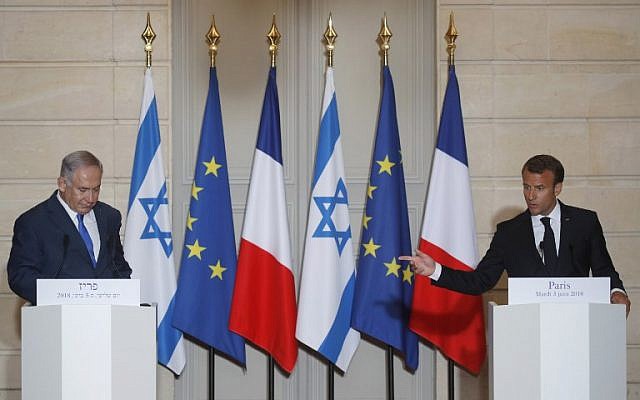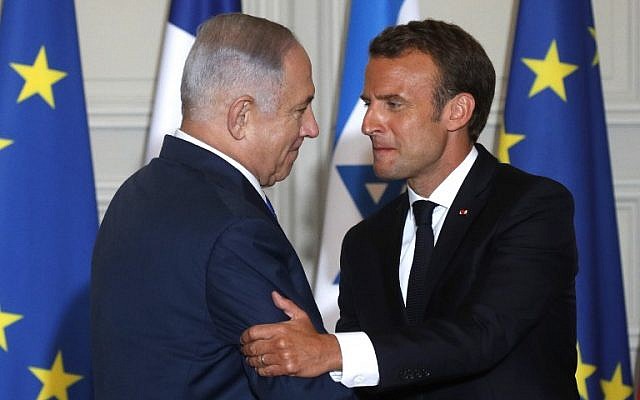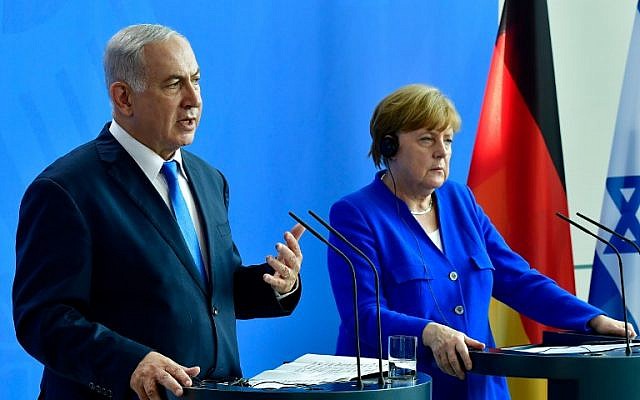After talks with prime minister, French President Macron warns recent escalation will lead to conflict, urges efforts at stabilization

Prime Minister Benjamin Netanyahu said Tuesday that he did not ask French President Emmanuel Macron to withdraw France from the Iran nuclear deal because he believes renewed US sanctions against the Islamic Republic will sink the 2015 accord.
Netanyahu met with Macron at the Elysee Palace in Paris as part of his European tour, aiming to rally support from allies against Iran. In addition to the nuclear deal, the prime minister also raised the subject of pushing Iranian forces out of Syria.
“I didn’t ask President Macron to withdraw from the nuclear deal with Iran because I think it is going to collapse anyway soon under pressure from US sanctions,” he said at a joint press conference with Macron after a closed-door meeting between the two leaders.
“What we focused on, and what I focused on, is how to stop Iranian aggression in the region,” he said.
However, Netanyahu did urge the French leader to impose economic sanctions on Iran to help dissuade it from pursuing a nuclear weapon.
“The nuclear archive proved that Iran is interested in a military nuclear program, and I think it’s time to put pressure on the Islamic Republic,” he said, referring to a haul of over 100,000 documents Israeli intelligence agents spirited out of Iran which showed that the country had been actively trying to develop atomic weapons before the deal, despite repeatedly denying that it was doing so. Netanyahu showcased the documents himself at a press conference he gave last month.

At the briefing, Macron warned of the risk of an “escalation” in the Iranian nuclear standoff after Tehran announced plans to boost uranium enrichment capacity to pressure Europeans scrambling to save the landmark deal.
He called on “everyone to stabilize the situation and not give into this escalation which would lead to only one thing: conflict.”
Macron noted that while France shares Israel’s concerns regarding Iran’s actions in the region, his government stands by the nuclear agreement. He said the international community should seek to curb Iran’s ballistic missile program through a separate deal, and not by re-vamping the existing agreement.
The French president said he doesn’t see how exiting the nuclear deal would help improve regional stability.
How can one “think that a total absence of controls and commitments is better than the 2015 framework?” he asked.
Macron also pointed blame in the direction of US President Donald Trump for unilaterally pulling out of the hard-fought 2015 deal designed to stop Tehran getting a nuclear bomb.
“When you decide to bring an end to a deal on your side, that does not encourage the other party to respect it,” he said, calling this “solid common sense.”
He stressed he had “no indication” that Iran had breached the terms of the deal, which Trump walked away from last month.
Netanyahu held similar talks with German Chancellor Angela Merkel in Berlin the day before.

Netanyahu was a staunch opponent of the nuclear deal, and welcomed the Trump administration’s decision last month to withdraw from it. Germany, Britain, France, Russia, and China, which also signed the agreement, have said they want to preserve it. The Trump administration has said it will apply severe sanctions on Iran by the end of the year, including penalties against companies that trade with the country.
Iran informed the UN nuclear watchdog on Tuesday that it will increase its nuclear enrichment capacity within the limits set by the 2015 agreement, known as the Joint Comprehensive Plan of Action.
Aside from its concerns over Iran’s nuclear program, Israel has also sounded the alarm on what it says is Iranian military entrenchment in Syria, where Iran is helping the Syrian regime to end an insurgency in its eighth year. Israel says Iran is trying to establish bases in southern Syria from which to attack the Jewish state, and has vowed to use all means to foil the efforts. A number of airstrikes by Israel against Iranian targets in Syria have further raised already bellicose tensions between Jerusalem and Tehran.
Netanyahu and Macron were scheduled to cap the day with a visit to an exhibit on Israeli innovations as part of events commemorating the 70th anniversary of Israel’s founding.
The visit will inaugurate the French part of the joint “France-Israel Season,” a series of cultural events that lasts 6 months. The initiative was planned in 2013 under Macron’s predecessor.
A group of pro-Palestinians associations have demanded the cancellation of the events. They have called for a street protest Tuesday in front of the exhibition site to denounce Israel’s “war crimes.”
As reported by The Times of Israel
